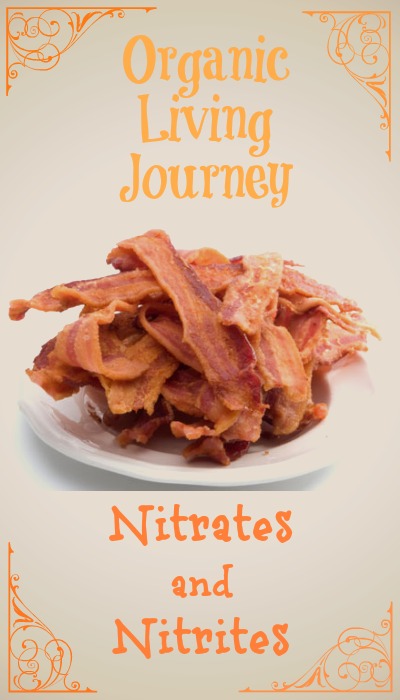This post may contain affiliate links. Read our disclosure here.
The following is part of an Organic Journey Guest Post Series, written by Amy a long time helper behind the scenes of Southern Savers.
The last few weeks, we have been talking about toxic load and starting at the top of the food chain to figure out how to get the best bang for our bucks in reducing our intake of toxins. We’ve covered chicken and now it is time to examine pork. I know that pork is a controversial topic on its own due to everything from religious reasons to fat content. If you don’t want to eat pork, I totally respect your decision. However, I’m a southern gal and bacon is going to find its way into my home every now and again. In light of that, I want to make the wisest choices possible when it comes to pork. (Not to mention that bacon is my daughter’s favorite food–even with her limited access to it!) When you start looking for healthier bacon, hot dogs and other pork products, one of the first big labels you will see is “No Nitrites or Nitrates Added.” I thought I’d start my research there since I honestly have no idea of what a nitrite or nitrate was.
As a disclaimer, let me say that I am not a scientist or a doctor. I’m pouring over these articles that take me back to high school chemistry and make me wish that I had actually retained more of what I learned twenty years ago. That being said, let me attempt to share with you what I’ve learned about nitrates and nitrites.
Sodium nitrates and sodium nitrites are used as a preservative. They extend the shelf life of meats, add a particular flavor and they keep cured meat a pretty red color (without them, meat would be an unappealing gray.) Nitrates aren’t really the problem, but they break down into sodium nitrites. Sodium nitrites aren’t the problem either. After a phone consultation with my college roommate, I walked away with this great example. Sodium nitrites are like gremlins. Did you watch that movie growing up? I didn’t. I was totally terrified, but I do remember this. Gremlins were uber cute and fluffy creatures, but if you fed them after midnight, they became these horrible monsters. Sodium nitrite is the same way. It is totally harmless on its own, but if you combine it with protein, it reacts and forms nitrosamines. Nitrosamines are the real monsters.
Potential Dangers of Nitrosamines
1. Sodium nitrites are banned in many countries because of how they turn into nitrosamines. And nitrosamines are known carcinogens. Some say that they increase the rates of colon, stomach, and pancreatic cancers the most.
2. Dr. Suzanne DeLaMonte, a Neuropathologist, has found links between diabetes, Alzheimer’s, and nitrosamines. She says, “Years ago, a few scientists suggested that nitrosamines might cause diabetes. The concept was not pursued until now. We performed experiments in the laboratory and showed that very low, limited exposures to nitrosamines (the type found in food) cause Alzheimer’s-type brain degeneration, dementia, diabetes, fatty liver disease and obesity. Adding high fat to the diet made the disease-causing effects of nitrosamines much worse….All of the major diseases related to insulin resistance, which are now epidemic in the United States, could be caused by exposure to low doses of nitrosamines over a period of years.”
3. For others the danger is simply headaches. For years, I noticed that I was more prone to getting a headache right after I had something with nitrites in it. I’m not alone. The National Headache Foundation lists nitrites/nitrates as a trigger.
Controversy and Confusion
It seems pretty simple then, right? If nitrates and nitrites can morph into their evil cousin nitrosamines, then we avoid them. We buy products with no nitrites or nitrates added, right? Oh, if only it were that simple. Natural and organic companies have found a way to mimic the flavor of the meat we love by using celery powder or celery juice. Seems harmless; after all, it’s celery. Applegate, one of the leading producers of natural and organic processed meats explains it this way, “All animal proteins are made up of amino acids that contain naturally occurring nitrites and nitrates. And so Applegate products made with animal protein will have levels of naturally occurring nitrites and nitrates. In addition, the celery juice and sea salt used to cure our meats also contain naturally occurring nitrates.” So, Applegate and other “No Nitrites or Nitrates Added” companies aren’t adding the synthetic nitrites, they are using natural sources instead.
The USDA is actually at the root of the labeling confusion. They require processed meats that don’t have the synthetic sodium nitrite or nitrate to be labeled as uncured (even though they have been cured by natural sources) and to have the added label of No Nitrites or Nitrates Added. Companies like Applegate have actually petitioned for the USDA to simplify the labeling, but without success.
Bottom-line is this: if you are buying processed meat, you are most likely getting either synthetic or natural nitrites with it. Now what do we do?
Three Differing Camps
There are several different responses to all of this information. Here are the ones that I found most prevalent.
1. Since nitrites and nitrates are naturally occurring in much higher doses in certain veggies and even in our saliva, then it is no big deal. Eat up. Some think that it is all one big marketing hoax (which I find hard to believe since the USDA is behind the labeling requirements.) Besides, they say, meat companies are adding ascorbic acid into foods with sodium nitrites in order to try to prevent the formation of nitrosamines. “Don’t worry, eat bacon” is their general philosophy.
2. The second camp is more concerned about avoiding synthetic nitrites. They say, “It’s also worth noting that processed meats are not the only sources of nitrites. Green leafy vegetables and root vegetables contain naturally occurring nitrites, though it’s thought that compounds in the vegetables inhibit the formation of the harmful nitrosamines in your body.” The thought process is that synthetic nitrites and nitrates lack certain vitamins and potentially some other property yet discovered in naturally occurring sources of nitrites. Because of this lack you are at a higher risk for nitrosamines to form and thus be exposed to the dangers listed above. Their mantra, eat cautiously.
3. The third camp believes that all nitrites are to be avoided-synthetic and natural. Marji McCullough, director of nutritional epidemiology for the American Cancer Society says here that, “Nitrite is nitrite and consumers should be aware of what they’re eating.” This camp’s mantra, “No nitrites for you!”
Then there is my camp. If I have to choose between something synthetic or something natural, I’m going to opt for the natural every time. So, if I am choosing between meat cured with sodium nitrite or nitrate and meat cured with celery powder and salt, I’m going to go for the celery. I’m also going to go with the all things in moderation policy. We don’t consume large amounts of pork as is. For now, until I learn more, we’ll keep our consumption minimal and savor it maximally. I know that there is way more to this topic than we have covered here, but hopefully this is enough information to get you thinking. Plus, this is only the first step in my learning about pork!! Next week, we’ll look at the differences between regular and organic pork to see what you are paying for.
So what do you think about sodium nitrites in all their forms? Are you going to live it up with bacon for breakfast every morning or do you have a different take on all of this? I’d love to learn from you all as so many of you have been researching these things for far longer than I have!



